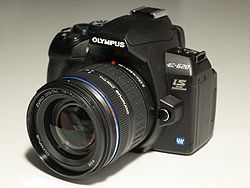 | |
| Overview | |
|---|---|
| Type | Digital single-lens reflex camera |
| Lens | |
| Lens | Four Thirds |
| Sensor/medium | |
| Sensor | Live MOS Four Thirds 17.3 mm × 13.0 mm (2× crop factor) |
| Maximum resolution | 12.3 million effective pixels , 4,032 × 3,024 pixels |
| Film speed | ISO 100 to 3200 |
| Storage media | CompactFlash Type I/II (UDMA), Microdrive, xD-Picture Card |
| Focusing | |
| Focus modes | Single Shot AF, Single Shot AF + MF, Continuous AF + MF, Continuous AF, Manual Focus |
| Focus areas | 7-Point TTL Phase Difference Detection AF |
| Exposure/metering | |
| Exposure modes | Auto, Program AE with shift), Aperture Priority AE, Shutter Priority AE, Manual, Scene Program, Scene Select (Scene Modes: Portrait, Landscape, Macro, Sport, Night + Portrait, Children, High Key, Low Key, DIS Mode, Nature Macro, Candle, Sunset, Fireworks, Documents) |
| Exposure metering | TTL Open-Aperture Metering System (49 Zones) |
| Flash | |
| Flash | Standard 4/3 flash hot shoe compatible with 4/3 system flashes, automatic built-in pop-up, 13 m ISO 100 guide number, 27 mm (equivalent in 135 format) lens focal length coverage; |
| Shutter | |
| Shutter | focal-plane shutter |
| Shutter speed range | 60–1/4000 seconds |
| Continuous shooting | 4.1 frame/s JPEG or 5 RAW |
| Viewfinder | |
| Viewfinder | Eye-Level TTL Optical Pentamirror with 96% coverage and 0.96× magnification |
| Image processing | |
| White balance | Auto, daylight, shade, cloudy, tungsten light, white fluorescent light, flash, manual, user-set |
| WB bracketing | ±3 stops in 1-stop increments; |
| General | |
| LCD screen | Vari-Angle 2.7'' HyperCrystal III TFT LCD with 230,000 pixels |
| Battery | BLS-1 Li-ion battery pack |
| Weight | 475 g (1.047 lb), body only |
| Made in | China |
The Olympus E-620 is a Four Thirds digital single-lens reflex camera from Olympus announced February 24, 2009. It combines features of the E-420 (smaller size), E-520 (image stabilization), and E-30 (new 12.3 MP sensor, slightly larger viewfinder, fold-out LCD, newer AF sensor).
Features
The camera is marketed by Olympus as the world's smallest DSLR with built-in image stabilization (IS). It is 130 mm × 94 mm × 60 mm in size and weighs 475 grams (1.047 lb), body only (533 g or 1.175 lb with battery and a Compact Flash memory card).
As with all Four Thirds cameras it has a crop factor of 2.0.
Apart from being sold as camera body only, the E-620 is available with three lens configurations:
- The Zuiko 14–42 f/3.5–5.6 lens
- The 14–42 lens and the Zuiko 40–150 f/4–5.6 telephoto zoom
- The extremely compact 25 mm f/2.8 "pancake" lens
Unlike the E-420 and E-520 it has an Olympus-designed battery grip, HLD-5. The E-620 also has its own underwater housing, PT-E06, submersible down to 40 meters.
E-600
In August 2009 a slightly down-specced budget version of the E-620 was announced by Olympus, this model was called the E-600 and was available to the North American market only. The features not present on the E-600 are the illuminated function buttons and all but four of the art filters, other than that the E600 is an E-620 and has gradually spread out of North America through grey imports of both new and used cameras and is often thought of as a better value option to the E-620.
Gallery
References
- ^ Olympus E-620 – Looks Really, Really Good wrotniak.net 24 February 2009
External links
![]() Media related to Olympus E-620 at Wikimedia Commons
Media related to Olympus E-620 at Wikimedia Commons
- Review at popphoto.com
- Specifications at dpreview.com
- dpreview news
- Product page
- Full-length camera review
| Olympus Four Thirds system Digital SLR timeline | ||||||||||||||||||||||||||||||||||||||||||||||||||||||||||||||||||||||||||||||||||||||||||||||||||||||||||||||||||||||||||||||||||||||||||||||||||||||||||||||||||||||||||||||||||||||||||||||||||||||||||||||||||||||||||||||||||||||||||||||||||||||||||||||||||||||||||||||||||||||||||||||||||||||||||||||||||||||||||||||||||||||||||||||||||||||||||||||||||||||||||||||||||||||||||||||||||||||||||||||||||
|---|---|---|---|---|---|---|---|---|---|---|---|---|---|---|---|---|---|---|---|---|---|---|---|---|---|---|---|---|---|---|---|---|---|---|---|---|---|---|---|---|---|---|---|---|---|---|---|---|---|---|---|---|---|---|---|---|---|---|---|---|---|---|---|---|---|---|---|---|---|---|---|---|---|---|---|---|---|---|---|---|---|---|---|---|---|---|---|---|---|---|---|---|---|---|---|---|---|---|---|---|---|---|---|---|---|---|---|---|---|---|---|---|---|---|---|---|---|---|---|---|---|---|---|---|---|---|---|---|---|---|---|---|---|---|---|---|---|---|---|---|---|---|---|---|---|---|---|---|---|---|---|---|---|---|---|---|---|---|---|---|---|---|---|---|---|---|---|---|---|---|---|---|---|---|---|---|---|---|---|---|---|---|---|---|---|---|---|---|---|---|---|---|---|---|---|---|---|---|---|---|---|---|---|---|---|---|---|---|---|---|---|---|---|---|---|---|---|---|---|---|---|---|---|---|---|---|---|---|---|---|---|---|---|---|---|---|---|---|---|---|---|---|---|---|---|---|---|---|---|---|---|---|---|---|---|---|---|---|---|---|---|---|---|---|---|---|---|---|---|---|---|---|---|---|---|---|---|---|---|---|---|---|---|---|---|---|---|---|---|---|---|---|---|---|---|---|---|---|---|---|---|---|---|---|---|---|---|---|---|---|---|---|---|---|---|---|---|---|---|---|---|---|---|---|---|---|---|---|---|---|---|---|---|---|---|---|---|---|---|---|---|---|---|---|---|---|---|---|---|---|---|---|---|---|---|---|---|---|---|---|---|---|---|---|---|---|---|---|---|---|---|---|---|---|---|---|---|---|---|---|---|---|---|---|---|---|---|---|---|---|---|---|---|---|---|---|---|---|---|---|---|---|
BODY FEATURE: In-Body Image Stabilization | ||||||||||||||||||||||||||||||||||||||||||||||||||||||||||||||||||||||||||||||||||||||||||||||||||||||||||||||||||||||||||||||||||||||||||||||||||||||||||||||||||||||||||||||||||||||||||||||||||||||||||||||||||||||||||||||||||||||||||||||||||||||||||||||||||||||||||||||||||||||||||||||||||||||||||||||||||||||||||||||||||||||||||||||||||||||||||||||||||||||||||||||||||||||||||||||||||||||||||||||||||



